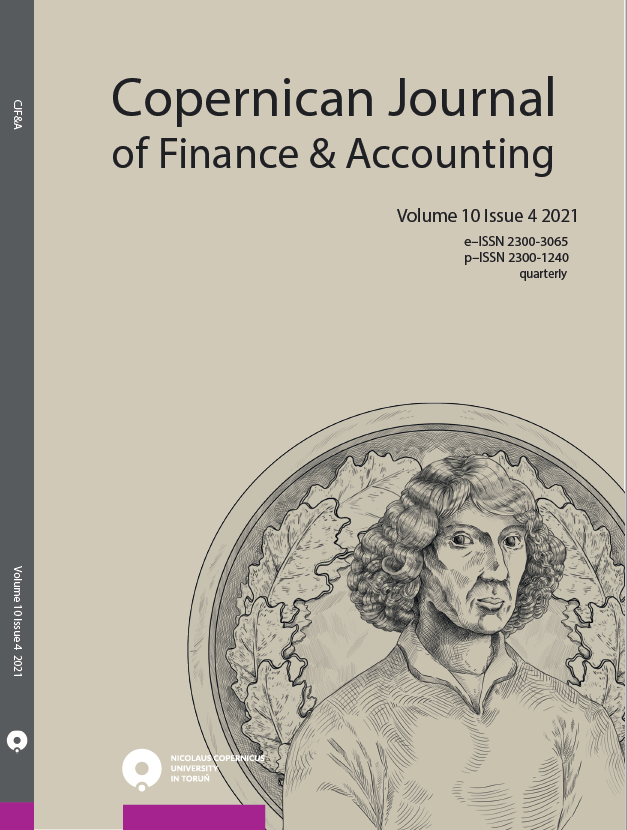BANKING SHORT- AND LONG-TERM STABILITY: A COMPARATIVE STUDY BETWEEN ISLAMIC AND CONVENTIONAL BANKS IN GCC COUNTRIES
DOI:
https://doi.org/10.12775/CJFA.2021.019Słowa kluczowe
Islamic finance, Islamic banks, conventional banks, financial stability, Z -score, LADR ratioAbstrakt
This research empirically assesses the contribution of Islamic finance to the financial stability of banks. The empirical analysis is based on the annual data related to 103 banks (51 Islamic banks and 52 conventional banks) operating in six countries of the Gulf Cooperation Council (GCC) region during the period 2006–2015. The LADR ratio was computed and used to measure banks stability in the short term, and the Z -score was used to assess long-term stability.
The results show that, overall, Islamic banks are financially more stable in the short-term but less stable in the long term than conventional banks. The comparative analysis of the financial stability determinants in the two systems shows that these determinants contribute differently to the short- and long-term financial stability of Islamic and conventional banks. This is due to the dissimilarities in the two operating principles.
Bibliografia
Abedifar, P., Ebrahim, S.M., Molyneux, P., & Tarazi, A. (2015). Islamic banking and finance: Recent empirical literature and directions for future research. Journal of Economic Surveys, 29(4), 637-670. http://dx.doi.org/10.1111/joes.12113.
Ariff, M., & Rosly, S.A. (2011). Islamic banking in Malaysia: Unchartered waters. Asian Economic Policy Review, 6(2), 301-319. http://dx.doi.org/10.1111/j.1748-3131.2011.01208.x.
Beck, T., Demirgüç-Kunt, A., & Merrouche, O. (2013). Islamic vs. conventional banking: Business model, efficiency and stability. Journal of Banking & Finance, 37(2), 433- 447. http://dx.doi.org/10.1016/j.jbankfin.2012.09.016.
Chakroun, A.M., & Gallali, M.I. (2015). Islamic Banks and Financial Stability: An Empirical Analysis of the Gulf Countries. International Journal of Business and Commerce,5(3), 64-87.
Ciukaj, R. (2016). Managing Financial Stability By The European Central Bank In The Period 2008– 2012. Copernican Journal of Finance & Accounting, 5(2), 57-72. http://dx.doi.org/10.12775/CJFA.2016.015
Eyih, S., & Bouchetara, M. (2020). Islamic vs. conventional banking: efficiency and stability. A critical review of the literature. Revue d’économie et de management, 19(2),167-177.
Hasan, A.I., & Risfandy, T. (2021). Islamic banks’ stability: Full-fledged vs Islamic windows. Journal of Accounting and Investment, 22(1), 192-205. http://dx.doi.org/10.18196/jai.v22i1.10287.
Huda, A.N. (2012). The development of Islamic financing scheme for SMEs in a developing country: The Indonesian case. Procedia-social and behavioral sciences, 52, 79- 186. http://dx.doi.org/10.1016/j.sbspro.2012.09.454.
Islam, M.U., & Kozokov, S. (2009). Stability of Islamic and Conventional banks, an empirical comparative analysis. Master thesis. Sweden: Lund University.
Kabir, M.N., & Worthington, A.C. (2017). The ‘competition–stability/fragility’nexus :A comparative analysis of Islamic and conventional banks. International Review of Financial Analysis, 50(C), 111-128. http://dx.doi.org/10.1016/j.irfa.2017.02.006.
Khan, F. (2010). How ‘Islamic’ is Islamic banking? Journal of Economic Behavior and Organization, 76(3), 805-820. http://dx.doi.org/10.1016/j.jebo.2010.09.015.
Rashid, A., Yousaf, S., & Khaleequzzaman, M. (2017). Does Islamic banking really strengthen financial stability? Empirical evidence from Pakistan. International Journal of Islamic and Middle Eastern Finance and Management, 10(2), 130-148. http://dx.doi.org/10.1108/IMEFM-11-2015-0137.
Sakarya, B. (2016). Financial Stability of Islamic (Participation) Banks in Turkey. Munich Personal RePEc Archive, 69451, 1-25.
Suzuki, Y., Miah, M.D., Wanniarachchige, M., & Sohrab, U. (2017). Banking and economic rent in Asia: Rent effects, financial fragility, and economic development. London, NY : Routledge.
Tekdogan, O.F., & Atasoy, B.S. (2021). Does islamic banking promote financial stability? evidence from an agent-based model. Journal of Islamic Monetary Economics and Finance, 7(2), 201-232. http://dx.doi.org/10.21098/jimf.v7i2.1323.
Wahid, M.A., & Dar, H. (2016). Stability of Islamic versus Conventional Banks: A Malaysian Case. Journal Ekonomi Malaysia, 50(1), 111-132. http://dx.doi.org/10.17576/JEM-2016-5001-09.
Youssef, M.H (2017). Financial stability of Islamic and conventional banks. Unpublished Thesis. Sweden: Lund University.
Zahra, S.F., Ascarya, A., & Huda, N. (2018). Stability measurement of dual banking system in Indonesia: Markov switching approach. Al-Iqtishad Jurnal Ilmu Ekonomi Syariah, 10(1), 25-52. http://dx.doi.org/10.15408/aiq.v10i1.5867.
Pobrania
Opublikowane
Jak cytować
Numer
Dział
Licencja

Utwór dostępny jest na licencji Creative Commons Uznanie autorstwa – Bez utworów zależnych 4.0 Międzynarodowe.
Statystyki
Liczba wyświetleń i pobrań: 888
Liczba cytowań: 0



